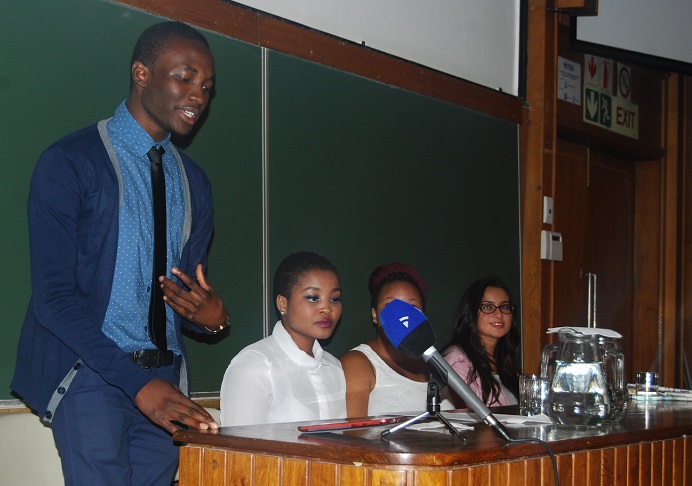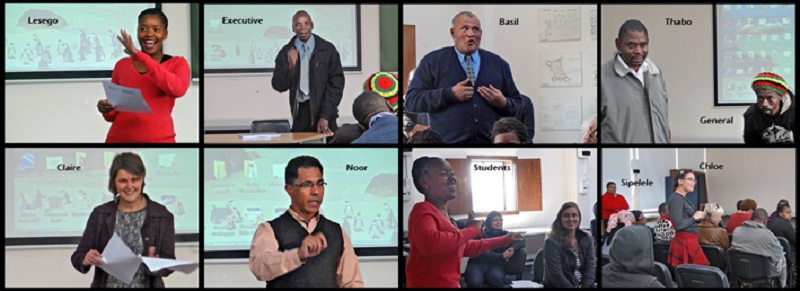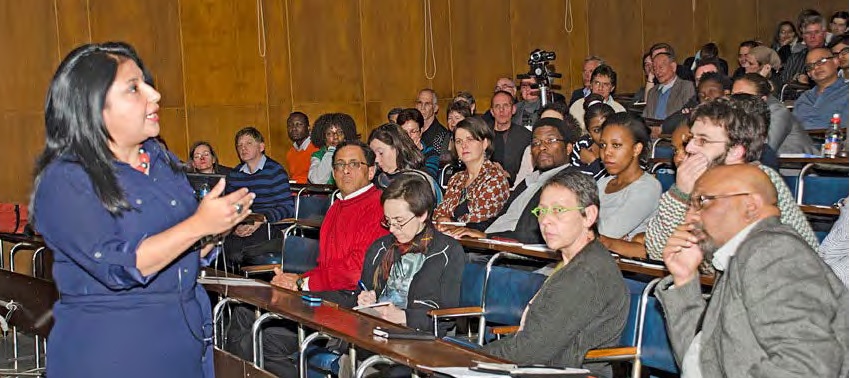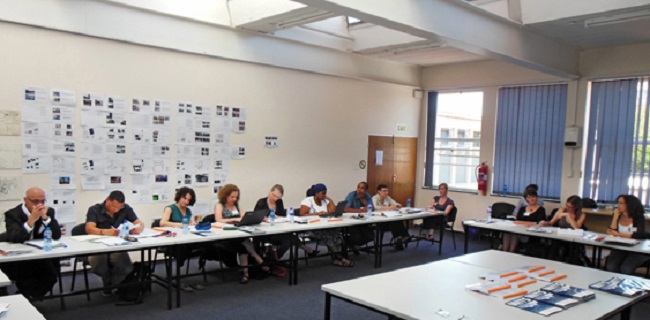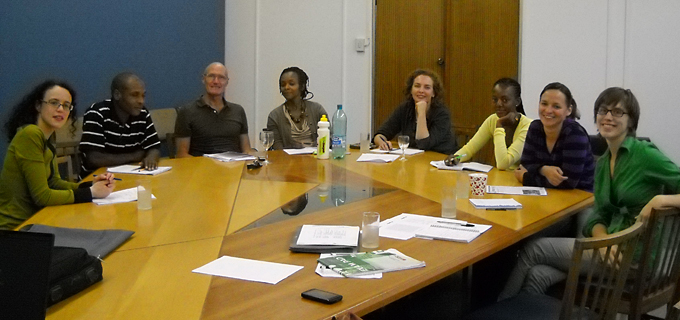2015
Global Platform for the Right to the City Africa Regional Meeting
(28 November 2015)
On 28 November CUBES hosted the Africa Regional Meeting of the Global Platform for the Right to the City (GPR2C) at the Dorothy Suskind Auditorium, John Moffat Building.
The regional meeting was convened to host a debate and discussion about the implementation of the Right to the City from a regional perspective. Participants from a different fields – social movements representatives, academics, human rights defenders, public authorities etc - and representing a number of African countries attended the event. Download the programme to read more about the event. View photos from the workshop here.
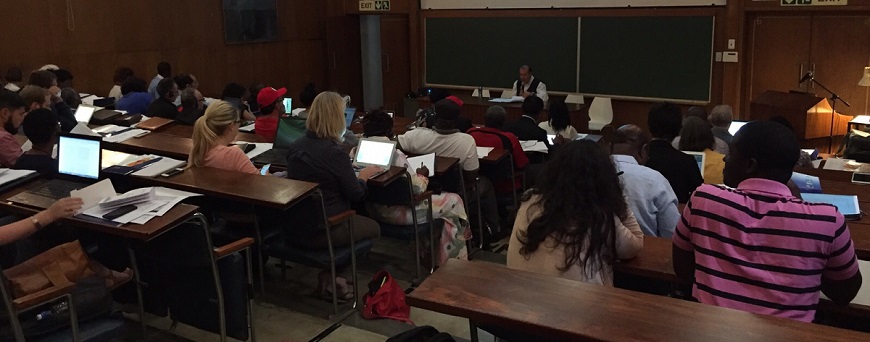
Panel Discussion on Urban Research in South Africa
(18 August 2015)
On 18 August 2015 CUBES, in partnership between the SARChI in Spatial Analysis and City Planning, the Gauteng City Region Observatory (GCRO) and the Wits City Institute hosted a panel discussion on "South Africa’s urban agenda and its relationship to urban research" as part of the weekly Faces of the City seminar series.
The panel discussion included inputs from a number of academics and researchers from urban centres across South Africa, including Prof Marie Huchzermeyer (CUBES), Prof Edgar Pieterse (African Centre for Cities, University of Cape Town), Prof Philip Harrison (SARChI, Wits), Prof Alan Mabin (Centre for the Advancement of Research, University of Pretoria), Prof Noëleen Murray (Wits City Institute), Prof Sophie Oldfield (Department of Environmental and Geographic Science, University of Cape Town), Prof Monique Marks and Dr Kira Erwin (Urban Futures Centre, Durban University of Technology). The discussion was wrapped up by Dr Modjadji Malahlela, who heads the Chief Directorate: Urban Development at the Department of Cooperative Governance and Traditional Affairs (COGTA).
Read more about the event and listen to podcasts of the speakers and the Q&A sessions here.
Panel Discussion at WISER Conference
(5 May 2015)
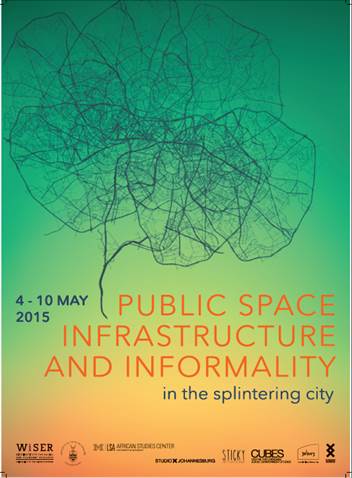 On 5 May 2015 CUBES and the NRF Chair in Spatial Analysis & City Planning co-hosted a panel discussion entitled "The Johannesburg Conundrum: Key dimensions of the materialities of delivering infrastructure" as part of the WISER-University of Michigan conference Public Space, Infrastructure and Informality in the Splintering City, which was held in Johannesburg between 4 and 10 May. As part of the same conference CUBES prepared and led the session on 9 May entitled "Rights to Infrastructure".
On 5 May 2015 CUBES and the NRF Chair in Spatial Analysis & City Planning co-hosted a panel discussion entitled "The Johannesburg Conundrum: Key dimensions of the materialities of delivering infrastructure" as part of the WISER-University of Michigan conference Public Space, Infrastructure and Informality in the Splintering City, which was held in Johannesburg between 4 and 10 May. As part of the same conference CUBES prepared and led the session on 9 May entitled "Rights to Infrastructure".
Javier Auyero Public Lectures
(11-14 August 2015)
Between 11 and 14 August 2015 CUBES, together with the Society, Work and Development Institute (SWOP) at Wits, co-hosted a Public Lecture Series on Urban Marginality by leading Argentinian urban sociologist Prof Javier Auyero (based at the University of Texas, Austin). During the months prior to these lectures a number of students and staff members engaged in a reading group on Auyero’s work and implications for the South African context.
Launch of CUBES Report on Models of Street Trading Management
(15 April 2015)
On 15 April 2015 CUBES launched its research report entitled In Quest for Sustainable Models of Street Trading Management, which provides lessons for Johannesburg after Operation Clean Sweep. As part of its commitment to support Johannesburg street trader organisations through research, and in the context of an engagement with the City of Johannesburg on the issue of street trading governance, in the aftermath of Operation Clean Sweep, CUBES has explored what research teaches us about sustainable and progressive street trading management. The report, straddling scholarly analyses and policy recommendations, aims at opening spaces of engagement between academic research and urban practitioners, activists and officials.
The launch was chaired by Prof Paul Jenkins, Head of the School of Architecture and Planning, and Prof Claire Benit-Gbaffou, the author of the report, spoke at the launch. A roundtable of other speakers included the following: Edmund Elias (SANTRA), Graeme Gotz (GCRO), Prof Philip Harrison (SARChi Spatial Analysis and City Planning), Ryan Matthews (UGM), Phumulani Ndlovu (SAITF), and Lauren Royston (SERI).
Launch of Changing Space, Changing City and Urban Governance in Post-Apartheid Cities
(4 March 2015)
On 4 March CUBES co-hosted the launch of two edited volumes, together with the South African Research Chair in Spatial Analysis and City Planning, UKZN Press and Wits University Press. The first book, Changing Space, Changing City: Johannesburg After Apartheid is edited by Philip Harrison, Graeme Gotz, Alison Todes and Chris Wray. The second book, Urban Governance in Post-Apartheid Cities: Modes of Engagement in South Africa’s Metropoles is edited by Christoph Haferburg and Marie Huchzermeyer.
The attendees were welcomed by the Vice-Chancellor of Wits University Prof Adam Habib, and guest speakers at the event were Prof Sue Parnell, Director of the African Centre for Cities at UCT, and Trevor Fowler, City Manager for City of Johannesburg. CUBES members were involved in both books, including the editing of Urban Governance in Post-apartheid Cities. View the book launch flyer.
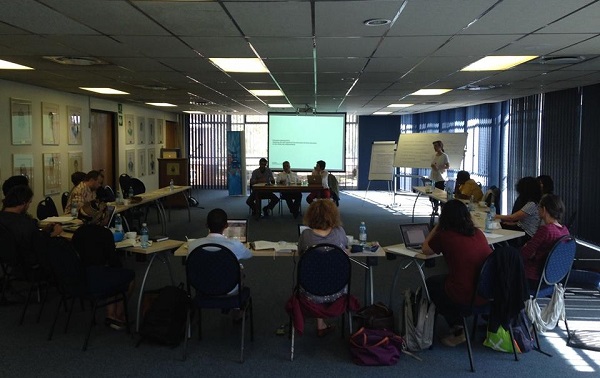 The seminar in Johannesburg was attended by a number of interested academics, NGOs and urban practitioners and took the form of a dialogue around key topics of conversation. It explored the possibility to draw useful comparisons between on-going inner city dynamics in São Paulo and Johannesburg, focusing on the self-organised practices of occupation and rehabilitation of vacant buildings in inner city areas experiencing pressures for urban regeneration. While there are fundamental differences between the conditions and practices that can be observed in São Paulo and in Johannesburg, the hypothesis is that these differences might potentially allow for in depth reflection on each city, and mutual learning.
The seminar in Johannesburg was attended by a number of interested academics, NGOs and urban practitioners and took the form of a dialogue around key topics of conversation. It explored the possibility to draw useful comparisons between on-going inner city dynamics in São Paulo and Johannesburg, focusing on the self-organised practices of occupation and rehabilitation of vacant buildings in inner city areas experiencing pressures for urban regeneration. While there are fundamental differences between the conditions and practices that can be observed in São Paulo and in Johannesburg, the hypothesis is that these differences might potentially allow for in depth reflection on each city, and mutual learning.

 On 5 May 2015 CUBES and the NRF Chair in Spatial Analysis & City Planning co-hosted a panel discussion entitled "The Johannesburg Conundrum: Key dimensions of the materialities of delivering infrastructure" as part of the WISER-University of Michigan conference
On 5 May 2015 CUBES and the NRF Chair in Spatial Analysis & City Planning co-hosted a panel discussion entitled "The Johannesburg Conundrum: Key dimensions of the materialities of delivering infrastructure" as part of the WISER-University of Michigan conference 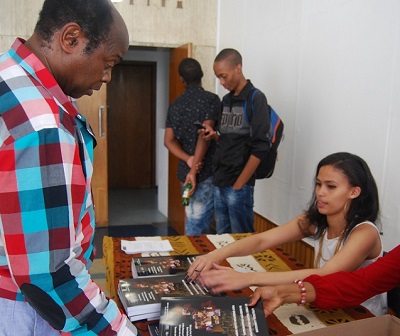 On 19 November CUBES and the School of Architecture and Planning launched a research report on street trading organisations in Johannesburg, as part of their focus on street trading politics and governance this year. The report, entitled
On 19 November CUBES and the School of Architecture and Planning launched a research report on street trading organisations in Johannesburg, as part of their focus on street trading politics and governance this year. The report, entitled 